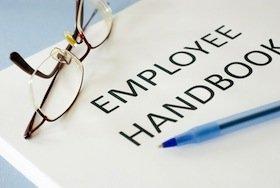of Employees
Employee Handbooks
New Jersey Employee Handbook Attorneys
Although employee handbooks are not legally required, many employers have them. Typically, they contain information about the employer’s compensation policies, employee benefits and workplace rules. For example, they often include information about topics such as:

Compensation
- Overtime pay
- Bonuses
- Commissions
- Stock options
- Severance pay
Benefits
- Paid time off
- Medical insurance
- Dental insurance
- Disability insurance
- Retirement benefits (such as a 401(k), 401(b) or pension)
Workplace Rules
- Anti-harassment, anti-discrimination and anti-retaliation policies
- Procedures to complain about harassment, discrimination or retaliation
- Termination and resignation
- Family leaves
- Medical leaves
- Employee conduct
- Discipline
- Meal and rest breaks
- Use of company equipment including email, internet, laptops and cell phones
- Workplace privacy
- Dress codes
- Attendance
Some employers provide a copy of their employee policy manuals to each of their employees. Others employers make copies available over the Internet or Intranet, or in central locations such as the employer’s human resources department, personnel department, or headquarters. But, whether or not you were provided a copy of your employer’s handbook, it can be important to understand the employer’s workplace practices and policies.
Employee Handbooks Can Be Binding Employment Contracts
Depending on the circumstances, an employee handbook can be a binding employment contract. In fact, unless there is a prominent disclaimer clearly stating it is not a binding agreement, New Jersey courts typically will enforce an employee handbook as a contract.
As a result, most employers include disclaimers. A typical type of disclaimer might say something like:
The employment relationship between the Company and its employees is employment-at-will. Any employee is free to end his or her employment with the Company at any time, for any reason, with or without notice. Likewise, the company may, at any time, decide end an individual’s employment with or without cause or prior notice. Neither this handbook nor any other verbal communication is a contract of employment. Only a written agreement executed by the Company’s President or Chief Executive Officer can alter the at-will relationship. Otherwise, the Company reserves the right to terminate an individual’s employment at any time for any reason.
Unfortunately, unless you have a separate agreement that says otherwise, a clear and prominent disclaimer is very likely to make your employer’s employee handbook unenforceable.
Provisions to Be Aware of in Your Employee Handbook
Since employee handbooks can be legally binding contracts, it is important to understand the policies included in them. In many instances, it may be worth speaking to a New Jersey employee handbook lawyer.
Some employers try to include unpopular policies in their manuals to make it less likely employees will realize they have agreed to them. Two such provisions to watch out for are non-compete agreements and arbitration provisions.
Non-Compete Agreements
Some handbooks state that the company’s employees cannot work for a competitor for a period of time after they stop working at their current job. Since a non-compete agreement can be very harmful when you are looking for your next job, it is highly recommended that you talk to an employment lawyer if your company’s employee handbook includes language which attempts to limit your right to work for one of its competitors in the future.
Arbitration Clauses
Likewise, some employee policy manuals include arbitration provisions that require you to waive your right to bring a lawsuit or have a jury trial if you are wrongfully discharged or another one of your employment law rights has been violated.
Since jury trials are widely considered to be much fairer to employees than arbitration, you should consider talking to one of our New Jersey employee handbook attorneys if you are deciding whether to work for an employer that requires you to agree to arbitration as a condition of getting hired or keeping your job.
For more information, please see our Blog article: Employer Prohibited from Enforcing Arbitration Policy in Employee Handbook.
Contact Us
Please feel free to contact us online or to call us at (201) 777-2250 to schedule a consultation with an experienced New Jersey employee handbook lawyer.








